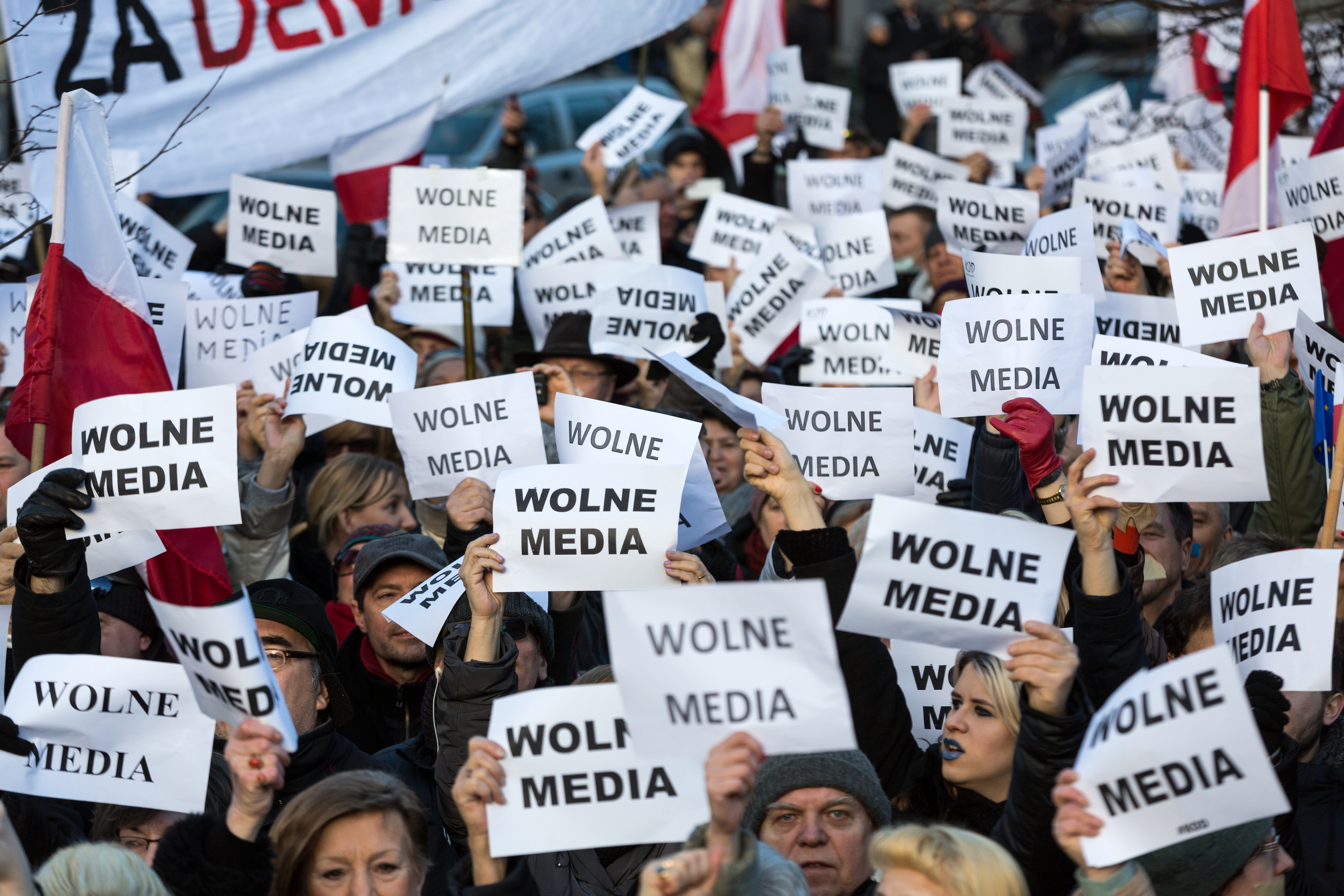Update: Polish public media put into liquidation
5th January 2024
The new Polish government has put public media entities into liquidation, following a political dispute over the organisations.

IN BRIEF:
- Polish news channel TVP info was suspended for more than a week, after a change in its governance brought about by prime minister Donald Tusk.
- The Polish President vetoed a bill related to the funding of public media, which proposed annual funding of 3 billion Złotys (~€ 689 Million).
- The Culture Ministry announced that public media would be dissolved, due to lack of funding.
- The legality of the liquidation of public media was the subject of heated debates.
– By Charlotte Pion
IN FULL:
The future of public service media in Poland remains unsettled, after a busy new year period, which saw the Polish President veto a bill related to media subsidies and the new coalition government put TVP into liquidation.
On 23 December, the President vetoed a bill put forward by the coalition related to state media subsidies, arguing that he did not agree with the allocation funds for “illegally seized public media”.
In reaction to this, the new Minister of Culture and representative of the National Treasury, Bartłomiej Sienkiewicz, announced on 27 December that TVP (Telewizja Polska), Polskie Radio, and the PAP (Polish Press Association) were put into liquidation.
Series of suspensions
Since the Public Media Alliance’s (PMA) last report about the management of TVP being dismissed before Christmas, the broadcaster has continued to be a focus of public and political attention.
Shortly after the sit-in staged by the former populist PiS government at the headquarters of TVP, one of the public news channels, TVP info, was suspended, only broadcasting their logo for more than a week. On the 20 December, all programmes on this channel stopped broadcasting, along with the English-language news channel TVP World. Shortly after the suspension of the channel, the director of TVP World announced on X (formerly Twitter) that he had been “relieved from his duties”.
The new government has been public in its ambition to reform TVP into an independent, impartial and pluralistic journalistic outfit. As claimed by many civil society organisations and media monitoring organisations for several years, TVP’s main evening news and the TVP Info channel have been critiqued as being used as propaganda tools for the PiS government. One of the reasons why the Coalition Party of Donald Tusk – the former President of the European Council – was elected in December is because of their commitment to return TVP to a source of “reliable information.”
TVP Info started broadcasting again on 29 December at 19:30 with the evening news bulletin, already displaying a new graphic image. The presenter told viewers the relaunched service “would now give voice to all sides and would aim to unite Poles rather than divide them.”, reported BTN.
All operations of TVP World have been suspended until mid January. pic.twitter.com/tiOnDEJG3u
— TVP World (@TVPWorld_com) December 27, 2023
Listen toour podcast
Uncovering and exploring the biggest
issues facing public media
Turbulent end of the year for public media
The situation facing public media did not end with the resumption of the news channel.
On 23 December, President Andrzej Duda vetoed a government bill related to the budget for 2024. In a statement following his decision, he said that he “decided to veto the budget-related act, which includes 3 billion Złotys for public media,” and argued, “There cannot be consent to this in view of the flagrant violation of the constitution and the principles of a democratic state of law. Public media must first be repaired honestly and legally.” It is the first time that the President used his power to veto to counter the initiatives of Donald Tusk’s administration.
In reaction to the President’s decision, the Minister of Culture Bartłomiej Sienkiewicz, signed an order to liquidate state media. “In connection with the decision of the President of the Republic of Poland to stop funding public media, I have decided to liquidate Telewizja Polska S.A., Polskie Radio S.A., and Polska Agencja Prasowa S.A.,” announced Mr Sienkiewicz.
The new government said that such action would give more protection to Poland’s public media companies from the ensuing political dispute. It would also allow the broadcasters to continue functioning while working on reforms. Putting these companies into liquidation was also described as a way to avoid mass lay-offs despite the lack of funding.
The minister also emphasised that the liquidation of state media may be withdrawn at any time by the owner/liquidator.
Komunikat Ministra Kultury i Dziedzictwa Narodowego
W związku z decyzją Prezydenta Rzeczypospolitej Polskiej o wstrzymaniu finansowania mediów publicznych podjąłem decyzję o postawieniu w stan likwidacji spółek Telewizja Polska S.A., Polskie Radio S.A. oraz Polskiej Agencji… pic.twitter.com/gXXQMxNMrS
— Ministerstwo Kultury i Dziedzictwa Narodowego (@kultura_gov_pl) December 27, 2023
Ownership and liquidation
Since the announcement of the liquidation, media experts have been debating as to whether this action was legal or not.
This question was particularly unclear concerning who should oversee the liquidation of TVP, where there has been a power tussle between competing factions.
Initially, the government lined up a candidate for the position of President of TVP’s Management Board – Tomasz Sygut – when they initially dismissed the previous President.
However, the National Media Council (RMN) – a body created by PiS in 2016, which the Constitutional Court ruled was partly unconstitutional, and whose authority has been rejected by the new coalition – appointed their own, alternative President, former presenter Michał Adamczyk.
Read more: New management at TVP as former gov’t leaders stage sit-in
Mr. Adamczyk’s nomination was approved by the three PiS figures on the five-seat RMN, while the two other members from the ruling party did not only oppose Mr. Adamczyk’s candidacy but also claimed it was not legal. Notes from Poland reported that Mr. Adamczyk became one of the main faces of the former ruling party’s transformation of TVP into a propaganda mouthpiece.
However, the role to appoint a liquidator falls to main shareholder of the company, who in this case, is the Ministry of Culture, represented by Bartłomiej Sienkiewicz. In the case of TVP, it was Daniel Gorgosz, the acting director of the corporate affairs office of TVP, who was appointed as liquidator of the company, giving him the right to carry out organisational changes.
Meanwhile, the role of liquidator for PAP was taken over by the President Marek Błoński, and for Polskie Radio, the role was given to Paweł Majcher, who used to be head of the political cabinet and press spokesman for Bartłomiej Sienkiewicz, then the Minister of Internal Affairs.
“There is no doubt about the need to improve PSM appointment procedures and governance model so that it reflects a wide spectrum of social representation and is free from political influence from government and political parties in power. {…} But the new government must not repeat the mistakes of the previous government. These reforms must respect the rule of law and the independence of newsrooms.” – Anthony Bellanger, Secretary Genral of the IFJ
These nominations were criticised by the former government, who requested that the prosecutor’s office “deal with the illegal actions of the Minister of Culture regarding the management and supervisory boards of public media” reported Business Insider.
But an attempt to amend the statutes of TVP, Polskie Radio and the PAP to charge all members of the management board of public media as liquidators made by the former Minister of Culture when he was still in office in November, suggest that the decision to put TVP into liquidation and his appointments of liquidators, made by the Minister Sienkiewicz, are in fact legal.
An international reaction
The abrupt changes made by the Coalition in recent weeks have been welcomed in some quarters, but with caution. While their intention to reform and put an end to the situation of “propaganda media” has been received with widespread support, prudence was still advised.
The International Press Institute (IPI) stressed that the new government had to pass comprehensive reform ensuring the right of Poland’s public media to work freely and shield them from future interference by any political parties.
The European Federation of Journalists (EFJ) and the International Federation of Journalists (IFJ) expressed similar feelings, stressing that “There is no doubt about the need to improve PSM appointment procedures and governance model so that it reflects a wide spectrum of social representation and is free from political influence from government and political parties in power,” as IFJ General Secretary Anthony Bellanger pointed out. “But the new government must not repeat the mistakes of the previous government. These reforms must respect the rule of law and the independence of newsrooms.”
Both organisations called for the respect of the rights of journalists without political interference, and in a context that guarantees citizens’ access to independent and reliable information.
The Public Media Alliance urges the different actors involved in the reforms of public media in Poland to ensure that their top priority is the independence of public service media. Any process towards establishing such an independent, plural and impartial public service media should be free of any political interference, to ensure the new entity is transparent, accountable, and trusted by Polish audiences.
Related Posts
20th December 2022
Poland: Proposed law set to boost prominence of controversial public broadcaster
An amendment to the Broadcasting Act’s…
2nd June 2020
Censorship in Polish public radio sparks debate about media freedom
A debate about media freedom and the…




